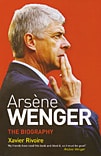 The Biography
The Biography
by Xavier Rivoire
Aurum, £16.99
Reviewed by David Stubbs
From WSC 248 October 2007
There is, among the photographs included here, a picture of Arsène Wenger in a line-up for FC Duttelheim, at the age of 11 in his native Alsace. So exactly did he look then as he does now, from the neck up at any rate, that you might suspect a mischievous bit of photoshopping. The combined, hawkish air of scrutiny but also inscrutability is already engraved on to his countenance. For Wenger, despite numerous examples cited of his thoughtfulness and considerateness, doesn’t always seem quite human. Arsenal supporters have loved and revered the man but have also found him, emotionally, to be a bit of a closed book. Which is why the rise in his spats with a succession of managers, including Glenn Roeder, Alan Pardew, Martin Jol, and, of course, Sir Alex Ferguson and José Mourinho, have almost come as a relief to some fans, despite the fact that they have coincided with a decline in the club’s fortunes.
Originally published in France by Rivoire but now translated by Dominic Fifield and Paul Morris and updated for a British audience, this volume is an attempt to open the book on the manager and the man, and certainly benefits from access to former associates and friends whom a UK-based writer might have had more trouble reaching. As a player, Wenger never excelled, but he did benefit from his ability to read the game and this became his life’s governing passion, towards which he marshalled all of his impressive cerebral powers. A colleague from his Monaco days remembers his apartment containing little beyond a bed, a settee, a mess of clothes, a television and dozens and dozens of football videos over which he would pore.
And yet, despite this, he did cultivate tremendous people skills – one early triumph was George Weah, whom he successfully brought on at Monaco. A stint in Japan helped him realise, among other things, the benefit of correct diet and so it was that when he arrived at Arsenal in 1996, bringing apparently little with him other than the bizarre coincidence of his first name, he set about transforming a club hitherto better known for tedious obduracy and over-indulgence into something precisely the opposite. It was his masterstroke, however, not to ship off the old guard but, in the case of the sceptical Adams in particular, to extract several more great years from ageing bones.
Wenger inspires a certain awe because of the advanced, scientific precision of his methods, in the matter of diet and physiotherapy. It has been suggested that he has developed the equivalent skills of a doctor. He pays tremendous attention to detail, especially when it came to the interior design of the Emirates Stadium. He is meticulous in his preparations. However, what the book points to, without quite saying, is that all this accounts for his being such an incredibly poor loser, and the least popular manager among his peers.
Pragmatism is a word not in his vocabulary, it seems. And so, when things inevitably do go wrong despite his leaving so little to chance, this seemingly unflappable man responds with ill grace and bursts of ill temper, including one, recalled by Henry Winter, directed at his own press officer. Wenger has probably been, as Adams asserts, Arsenal’s finest ever coach and his triumphs are faithfully recorded here. But those exasperated at the limitations will probably have to stay exasperated. As Damien Comolli says of his former boss: “It simply doesn’t interest Arsène to win without playing well.”